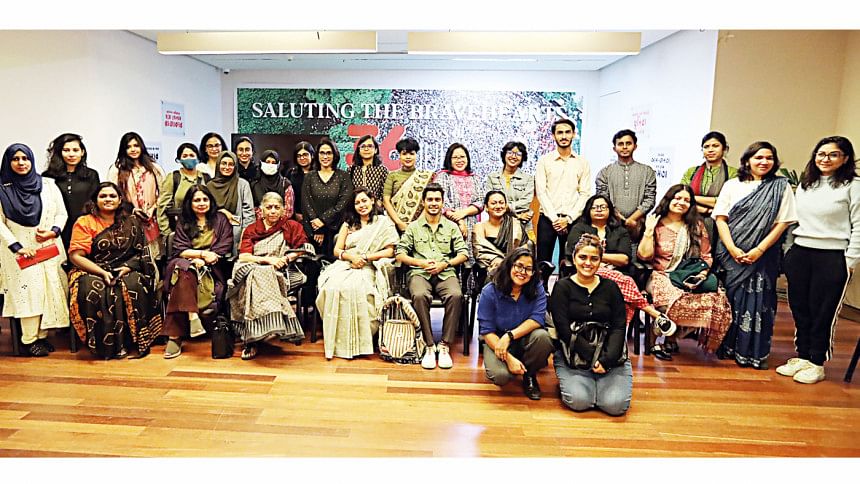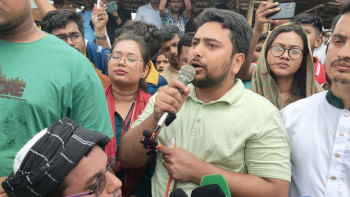Gender, Politics, and the Call for Change

In July, the antidiscrimination movement gained renewed momentum as courageous female students, standing side by side with their male peers, took to the streets in protest, enduring violent attacks while demanding their rights. Women in this region have long demonstrated extraordinary strength and resilience in the political arena, from Bangladesh's struggle for independence to the 2024 mass uprising.
Yet, over time, their voices have been muffled, marked by a decline in leadership representation and a disturbing rise in gender-based violence. Instead of being celebrated for their contributions, many women now find themselves disheartened and fearful, uncertain of what lies ahead.
A group of women united at The Daily Star Centre on the fourth day (December 3, 2024) of the weeklong program, "36 Days of July: Saluting the Bravehearts," to share their stories and perspectives.
The dialogue, titled "Women, Life, and Freedom," began with topics on political representation and branched out to other interconnected issues, including women's rights, gender discrimination, and sexual harassment.
Following the collapse of the previous government, there was a heightened anticipation among citizens for the establishment of a new interim administration. However, the minimal representation of women in the new government raised numerous questions and concerns.
"It was disturbing for all of us. When there was women's representation, it should not have been tokenistic. The worst part is that when we started discussing this and posting on social media, another woman was added to the list, but even that decision was made by them," said one of the speakers.
Adding to this point, Wasima Farzana, an aspiring anthropologist, said that women in politics may find themselves in a marginalized position due to their lack of experience. "The way women are functioning can be described as embodying masculinity. Their habit of being present in public and political spaces is low. We must nurture the habit of occupying these spaces," she emphasized.
Habiba Nowrose, an academician and photographer, aptly said, "Questions are being raised about why women's visibility in political representation remains low. I believe a constructive structural discussion is missing from dialogues, even in seminars and meetings initiated by women-centric organizations. This lack of structural dialogue hinders the process of achieving meaningful reforms to increase women's participation in politics."
The nature of leadership has always differed between men and women. "In our political sphere, the approach to political participation is extremely masculine in a toxic way. It requires arrogance and an aggressive demeanor. Women do not naturally function that way. We must emphasize creating leadership spaces that are women-friendly," said Trishia Nashtaran, a female activist and founder of Meye Network.
An uprising does not signify that all daily life problems have vanished; they are still deeply embedded in the system. Issues such as security for women in public spaces, the availability of daycare facilities, and transport services often go unaddressed. Should we prioritize these concerns now, or leave them for later? Who will strongly advocate for them? These aspects require serious consideration. They said such a platform could help formulate action plans and influence policymaking to increase women's visibility and representation in politics.
The speakers further emphasized the importance of activism through different campaigns to highlight women's contributions and called for engaging the media as allies to reshape societal perspectives. Women also need to increase their political awareness and understand gender politics, they noted.
Dr. Sakia Haque, president of Travelettes of Bangladesh, advocated for increased visibility of women's work, stressing that the media should highlight their efforts to prevent them from being overlooked.
Rabeya Jhumur, a journalism student, called for amplifying the voices of marginalized groups, such as homemakers and women from rural areas. "When their rights are violated, no one advocates for them."
One speaker proposed creating a platform that brings together all women's organizations, aiming to formalize an action plan that includes policy-making and emphasizes activism.
Shehreen Ataur Khan, assistant professor at Jagannath University, emphasized the importance of quotas to address systemic inequalities. "Equality and equity are distinct concepts that must be understood from the family to the workplace and society as a whole. Quotas are vital for ensuring women have access to spaces from which they've been excluded."
Another speaker pointed out that schools should work alongside families to teach equitable roles for men and women, stressing that such foundational education is essential for transforming societal norms.
Naziba Basher, senior sub-editor at The Daily Star, highlighted the media's influential role in shaping public narratives. She criticized the media for sidelining women during movements, recalling how several media outlets deliberately excluded student protest organizer Nusrat Tabassum from a photo of protest leaders at the DB office. "Media professionals in positions of power must champion the inclusion of marginalized groups, including indigenous women, gender-diverse individuals, and women from low-income backgrounds," she urged.
After August 5, numerous incidents of sexual violence against women were reported. An indigenous woman was allegedly raped by two men in Ramgarh upazila of Khagrachari on August 22. The following month, a significant part of the Chittagong Hill Tracts (CHT) witnessed unrest, with houses and business establishments burned, leaving scores injured and resulting in deaths during sectarian violence.
"When things seemed to be settling down, the brutal incident occurred, clearly indicating a rise in violence that is often ignored by society. If this is what we call freedom, I question what kind of freedom it truly is," said indigenous activist Shuchi Marma. She highlighted the systemic oppression faced by indigenous communities and raised critical questions about whether they are being left behind, or if there is a deliberate effort to keep them marginalized.
Another individual from the hills echoed this sentiment, saying, "Even during the victory parade, I was called 'Chakma' by many. It stirs a mix of indifference and deep pain within me. I fear for my son, who faces stereotypical remarks in school"
Shireen Huq, the founding member of Naripokkho and chairperson of the newly established Women's Rights Commission, emphasized that women's growing anger could serve as a catalyst for change. "Don't let this anger fade. We hope to bring about change during this interim government that will help women progress and gain more visibility. This anger is the first step toward reform. Women must take ownership of public spaces to ensure their presence is felt," she said.
She also mentioned that there are 90 days ahead, during which they seek input from various sectors and generations.
Speakers further highlighted the need to involve men in telling women's stories to help reshape societal norms. They also called for social media movements to promote accurate and positive representations of women's contributions.
Shaveena Anam, facilitator of the discussion and Manager of New Content and Audience Research at The Daily Star, commented, "I've frequently heard people say, when discussing the limited representation of women, 'Now is not the right time for this conversation. Focus on reform first. Women, wait for your turn.' What we need is a neutral platform for women, one that can bring together advocates for rights and amplify the voices of those at the grassroots level."
Recommendations:
1. Structural dialogues are crucial for achieving meaningful reforms to increase women's participation in politics.
2. Long-term planning, including dialogues, action plans, and public involvement, is essential to help women understand their power and move forward with an affirmative attitude.
3. Equality and equity, as crucial elements, must be widely discussed, especially within families. Involving men in women's stories can be instrumental in reshaping societal norms.
4. It is vital to strengthen alliances among women, with the media serving as an influential component of society.
5. Women must claim public spaces to ensure their visibility.
Saudia Afrin is a journalist at the daily star

 For all latest news, follow The Daily Star's Google News channel.
For all latest news, follow The Daily Star's Google News channel. 



Comments